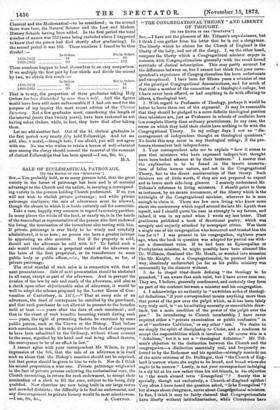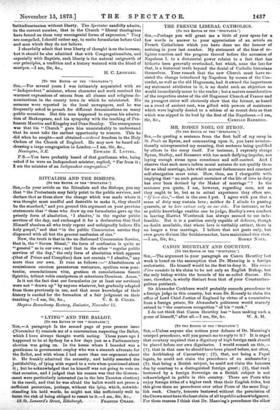"THE CONGREGATIONAL THEORY " AND LIBERTY OF THOUGHT.
[To THE EDITOR OF THE'SPECTATOR."] SIR,—I have not the pleasure of Mr. Tidman's acquaintance, but I think I can gather from his letter that be is not a clergyman. The liberty which he claims for the Church of England is the liberty of the laity, and not of the clergy. I, on the other hand, compare the liberty which a Congregational minister enjoys in common with Congregationalists generally with the creed-bound servitude of clerical subscription. This may partly account for the difference between us, but I cannot but think that your corre- spondent's experience of Congregationalism has been unfortunate and exceptional. I have been for fifteen years a minister of one of the principal Congregational denominations, and for much of that time a member of the committee of a theological college, but I have never been offered, or had anything to do with offering to others, a theological test.
1. With regard to Professors of Theology, perhaps it would be better to leave them out of the argument. It may be reasonable that they should be pledged to a more definite theological position than ministers are, just as Professors in schools of medicine have less complete liberty than ordinary practitioners. In any case, the terms on which they hold their chairs have nothing to do with the Congregational Theory. In my college days I saw no " dis- couragement of independent thought on theological questions." No doubt this may occur in any theological college, if the pro- fessors themselves lack independence.
2. Your correspondent asks me to explain " bow it comes to pass that ministers who have expressed indepen lent thought have been looked askance at by their brethren." I answer that the explanation is to be found in the innate conserva- tism of fallen human nature, and not in the Congregational Theory, but in the direct contravention of that theory. Such thinkers are of little worth, if they are not prepared to expect and to brave such side-long glances. I scarcely understand Mr Tidman's reference to living ministers. I should point to them as instances, by no means uncommon, of the liberty which is the birthright of the Congregational minister, wherever he is man enough to claim it. There are few men living who know more about the controversy which raged around the late Mr. Lynch than myself, and I should quote his case as strongly in my favour, and indeed, it was in my mind when I wrote my last letter. That gentleman published a book of devotional poetry, which was savagely and unjustly attacked by newspaper critics. Was there a single one of his congregation who honoured and trusted him the less for it? I was present in his congregation, eighteen years ago, when the book in question was adopted for partial use with- out a dissentient voice. if he had been an Episcopalian or Presbyterian minister, he might possibly have been silenced like Dr. Williams, dismissed like Mr. Heath, or worried into secession like Mr. Knight. As a Congregationalist, he pursued his quiet way, absolutely undisturbed (so far as his public ministry was concerned) by the clamour without.
3. As to chapel trust-deeds defining " the theology to be preached," I am aware that such exist, but I have never seen one. They are, I believe, generally condemned, and certainly they form no part of the contract between a minister and his congregation.
4. I acknowledge no authority in "unwritten codes of theologi- cal definitions," if your correspondent means anything more than that power of the pew over the pulpit which, as it has been lately very truly said, is " no humiliating necessity or unavoidable draw- back, but a main condition of the power of the pulpit over the pew." In introducing to Church membership I have never required either a "private examination or public confession" in or of "moderate Calvinism," or any other ism.' We desire to see simply the spirit of discipleship to Christ, and a readiness to accept the responsibilities which it involves. Of course this is a "definition," but it is not a " theological definition." Mr. Tid- man's objection to the distinction between the Church and the congregation—a distinction essentially real, and frequently re- ferred to by the Redeemer and his apostles—strongly reminds me of the acute criticism of Dr. Dollinger, that " the Church of Eng- land is narrow where she ought to be broad, and broad where she ought to be narrow." Lastly, is not your correspondent indulging in a sly hit at his new rather than his old friends, in his objection
to " the much abused term Evangelical ' "? Surely this is specially, though not exclusively, a Church-of-England epithet ! Very often I have heard the question asked, "Is he Evangelical"? but always about clergymen, never about Congregational ministers. In fine, I think it may be fairly claimed that Congregationalists have liberty without latitudinarianism, while Churchmen have slatitudinarianism without liberty. The Spectator candidly admits, gin the current number, that in the Church "liberal theologians have forced on them very uncongenial forms of expression." They care compelled, I should rather say, to recite formularies before God and man which they do not believe.
I cheerfully admit that true liberty of thought is on the increase, -but it should be also admitted that with Congregationalists, and -especially with Baptists, such liberty is the natural outgrowth of -our principles, a tradition and a history watered with the blood of 'martyrs. —I am, Sir, &c.,
H. C. LEONARD.



































 Previous page
Previous page